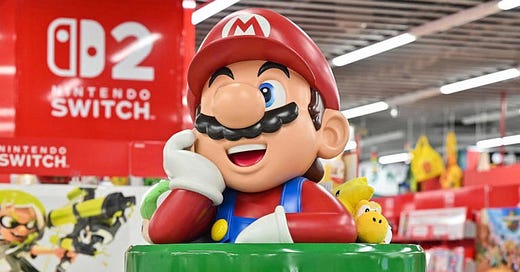The author is not a gamer, but he does like stocks. And today is a big day for the gaming industry: Nintendo will launch its new gaming console, Switch 2.
The gaming industry continues to grow. Global consumer spending on PC and console gaming will reach just over $85 billion in 2025, up from about $80 billion in 2024, according to Newzoo’s PC and Console Gaming Report 2025. The release of new consoles is a key driver behind this growth.
Unlike Sony or Microsoft, which have diversified tech businesses, Nintendo remains highly dependent on hit hardware-software cycles. The original Nintendo Switch, which launched in March 2017, secured Nintendo’s dominance after it experienced a few years of commercial failure with Wii U. These boom-and-bust cycles can make Nintendo a great stock to trade!
As of March 31, 2025, the Switch had sold 152.12 million units worldwide. This made it Nintendo's best-selling home console and the third best-selling video game console of all time, behind the PlayStation 2 and Nintendo DS. In the United States, the Switch surpassed the PlayStation 2's lifetime sales, reaching 46.6 million units sold as of November 30, 2024. Wow!
Let’s put that into perspective. Nintendo’s Switch is more commercially successful than any individual Disney franchise, with the possible exception of the Marvel Cinematic Universe (when accounting for full monetization). For the author, Nintendo remains the unsung alpha in content and IP. Super Mario, its flagship character, for example, is much more successful than Mickey Mouse ever was.
Why is the launch such a big deal?
A major console launch is like a new operating system for an entire industry. It sets the tone, expands the audience, and redefines the playing field for years to come. The first Switch triggered a 7-year boom in hybrid gaming and software monetization.
Three dynamics tend to take place with a launch:
1. Hardware Upgrade = Market Rejuvenation
New consoles deliver better graphics, faster processing, and more immersive experiences, resetting the innovation cycle.
2. Consumer Spending Surge
A new console drives hardware, software, and accessory sales. Launch titles and digital services (subscriptions, online play, in-game purchases) see spikes.
3. Ecosystem Renewal
Older users return while new users join. The total addressable market, to use pitch deck speak, is increased as old titles (Zelda, Mario, Dragon Quest) get upgraded.
What’s demand looking like?
It’s looking very, very good. According to Nintendo President Shuntaro Furukawa, over 2.2 million applications were submitted for the pre-order lottery through the My Nintendo Store in Japan. This number far exceeded Nintendo's expectations and surpassed the number of units available for delivery on the June 5 launch date. Yes, gamers can be fanatical!
Nintendo has set an initial sales target of 15 million units for the Switch 2 within the current fiscal year, ending March 2026. The street thinks Nintendo is being typically conservative.
What are the implications?
If Switch 2 is a blockbuster success, it has a few broader implications in the author’s opinion:
Retail and Economic Boost
Major retailers such as Target and Best Buy are expected to benefit from the Switch 2's launch. Best Buy, for instance, anticipates a 1% increase in comparable sales over the next four quarters due to the console's release.
Apple’s iPhone helped boost consumer spending after the 2008 crash. Nintendo’s Switch 2 won’t have the same impact, but it should be incrementally positive!
A Test for Global Supply Chains
If game consoles existed when Milton Friedman gave his famous speech about a pencil, he might have talked about the Switch instead. A game console exemplifies all that’s good about free trade. The IP comes from Kyoto, but its components come from the US (NVDA), it is assembled in Taiwan (Foxconn) and it is manufactured in South Korea (Samsung).
Nintendo has expressed concerns that such tariffs could impact the Switch 2's pricing and accessibility in the U.S. market. Let’s see what happens.
Gaming Industry Impact
Nintendo's financial outlook has improved with the Switch 2's debut. The company projects a 63.1% increase in sales to ¥1.9 trillion ($13.2 billion) and a 13% rise in operating profit to ¥320 billion ($2.22 billion) for the fiscal year ending March 31, 2026 but six other companies could be beneficiaries of the Switch 2 launch primarily as a result of Nintendo’s expanded ecosystem:
Koei Tecmo (3635)
The Company plans to release many titles for Switch 2. This should drive up volume (90M unit sales forecast), even as it invests heavily upfront.
Keep reading with a 7-day free trial
Subscribe to Mateen's Newsletter - Discuss The Tape to keep reading this post and get 7 days of free access to the full post archives.




